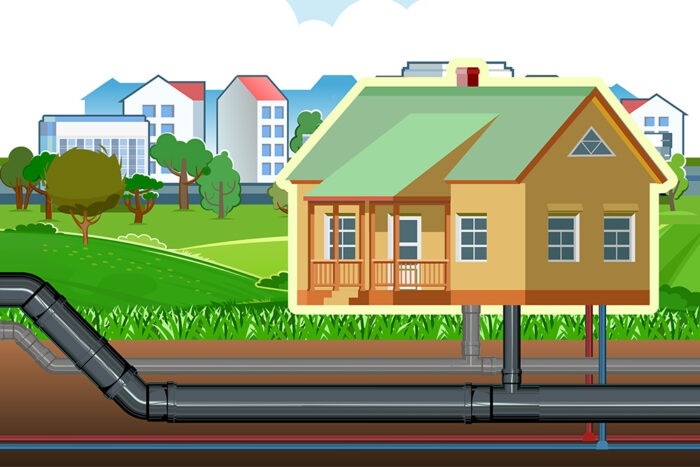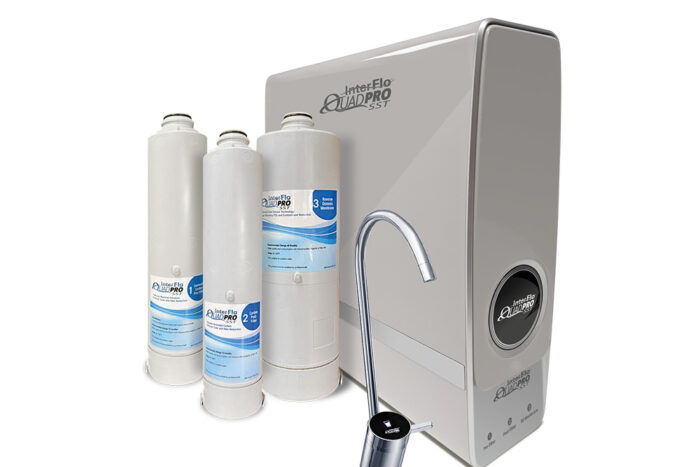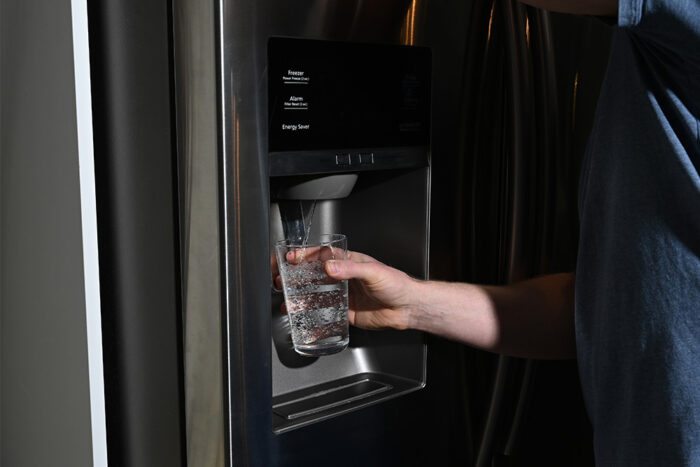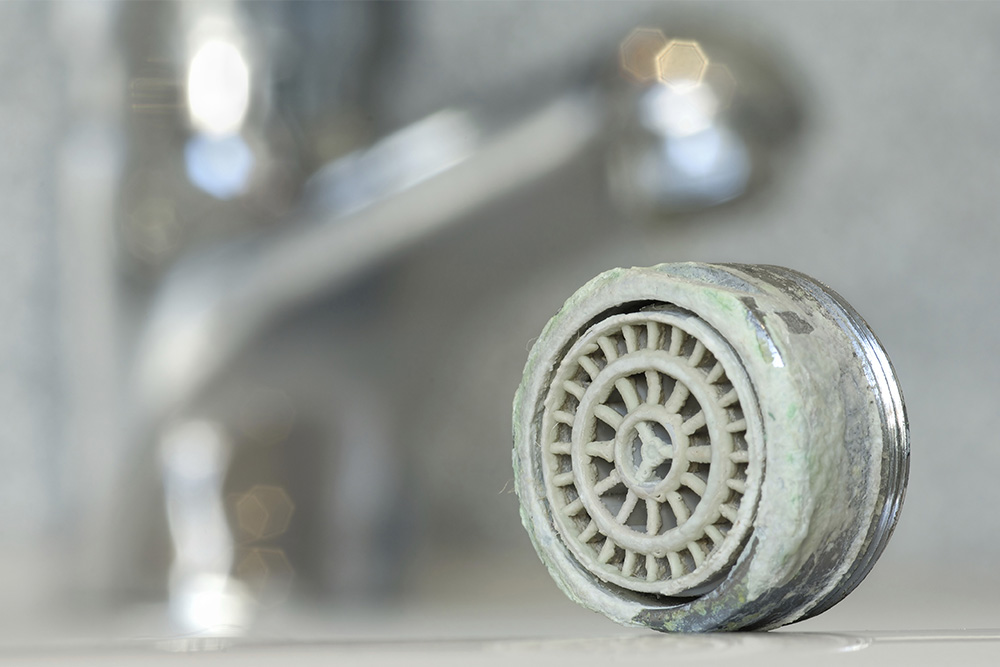You just moved into a new place and you notice something is not quite right. There’s something going on, and you have a sneaking suspicion it might have to do with the tap water.
Hard water problems can be a real hassle, especially for new homeowners who may be unfamiliar with the issues it causes. Solving those problems can vastly improve your family’s quality of life and get things back to normal again.
So What is Hard Water?
We all learned in school that water is H2O – two hydrogen atoms and one oxygen atom make up a water molecule, right? What many of us don’t realize is that extra stuff can get into the water we drink. Some of it is perfectly safe to consume, while other water contaminants could negatively impact your family’s health. But tap water is certainly not 100% pure H20.
Hard water is basically water containing a high mineral count. Groundwater often percolates through limestone where it picks up calcium and magnesium deposits.
Drinking water can also contain trace minerals like iron, which gets picked up from the soil, lakes and rivers – even older, corroded plumbing. In some regions, hard water may also contain manganese or aluminum.
Of course, things like calcium, magnesium and iron aren’t necessarily bad for you. In fact, they’re actually beneficial nutrients. However, hard water sediments can also carry potentially harmful bacteria along with them. A 2014 study found hard water scaling is directly responsible for bacterial growth in residential drinking water.
If your home gets water from a well, you most likely have hard water. But it’s not just a rural issue. The U.S. Geological Survey says 85% of homes in the nation have hard water.
Here are eight potential problems hard water causes. Do any of them sound familiar?
1. Your Water Tastes or Smells Funny
A strange odor or taste to drinking water is often one of the first clues you have a water conditioning problem. It’s a sure-sign there is hard water or some sort of bacterial contaminant.
For instance, if your water has an unpleasant metallic taste. That’s probably too much iron.
If your water smells like rotten eggs, that could be naturally occurring hydrogen sulfide gas or certain bacteria reacting with magnesium to form sulfates.
Some people say their water tastes like dirt.
That could be sediment (actual dirt), old pipes or algae. Algal blooms can also give tap water a moldy aftertaste.
No one likes to drink water with a funky smell or flavor. But that’s just the beginning of your problems.
2. You’re Getting Strange Stains
Ugly brown or reddish stains on the porcelain are a big embarrassment.
You can blame hard water for that too – specifically iron.
It’s no coincidence those stains look a lot like rust spots. The iron in your water could be coming from rusty pipes.
You’ll have to use a lot of elbow grease to get rid of those stains.
Some people suggest using vinegar to help clean and remove them. Unfortunately, the stains will keep reappearing until you fix your hard water problem.
3. You’re Constantly Cleaning Up Soap Scum
Another unsightly issue is the appearance of those white, hard water spots.
That’s what you get when water evaporates and leaves calcium deposits behind.
When you have hard water, you’ll notice nasty soap scum seems to accumulate all over the place. That’s because soap and the minerals in hard water just don’t play nicely together.
If your dishes are always spotty, it may not be your dishwasher, it’s probably your water. What’s worse – soap scum left on shower curtains can lead to the development of a microbial biofilm that might contain disease-spreading bacteria.
With hard water, you may find yourself cleaning the bathroom and kitchen more often and using more cleaning product to get the job done. Who wants to do that?
4. Your Showering Experience Suffers
Showering is your time to escape the world for ten minutes to wash the dirt and worries away. But when you have hard water, shower time can be ruined.
As we’ve mentioned, minerals cause hard water to react ineffectively with soap.
This makes it harder to get a good lather when you bathe. It also makes it more difficult to wash all the soap off your body, leaving a film of soapy residue on your skin.
Deposits from hard water can clog up your shower head too. That means weaker water pressure.
With hard water, you may not be getting as clean and you may notice your hair is hard to manage. Yes, hard water could even be responsible for your bad hair days.
- Find out more about showering in hard water
5. Your Pipes Keep Getting Clogged
Showerheads aren’t the only things that can get clogged up thanks to hard water.
It can cause major plumbing issues as well.
Scale deposits build up inside your pipes, like plaque inside an artery, constricting the flow of water, eventually leading to backups and the need to call a plumber for help.
If you have PVC or copper pipes, this probably is not an issue. It’s most-common with older, steel pipes.
6. Your Clothes Aren’t Getting Clean
Hard water can have a negative impact on laundry – and once again – it’s all due to the rocky relationship minerals like calcium and magnesium have with soap and detergent.
Soap is used to wash away dirt and grime, but when soap doesn’t get rinsed off, it can actually increase soil build up on your clothes.
Clothes washed in hard water often appear dingy and wear out faster. It can even make your towels scratchy and rough.
When you have hard water, you may have to buy detergent formulated to soften the water for you. However, you’ll likely have to use more laundry detergent (and hotter water) to get your clothes clean. It’s even advised that people with hard water use four times as much detergent.
Plus, just as iron stains your bathroom fixtures, it can stain your clothes. Premature yellowing of your whites could be caused by iron content in the water. When combined with bleach, iron oxidizes, and iron oxide is just another name for rust.
- Find out more about hard water and laundry
7. Your Family Has Skin Irritation Issues
Because washing in hard water will leave soap behind, it causes people’s skin to get dried out and itchy.
Mineral deposits left on the body can also suck moisture right out of your skin.
The skin condition eczema is fairly common, especially among younger children.
There is research indicating that bathing in hard water could cause eczema symptoms to worsen.
Another study concluded exposure to hard water could increase the risk of developing eczema in elementary-school-age children.
8. Your Appliances Are Wearing Out Quickly
This might be the most expensive hard water problem of all. Those scale deposits can wreak havoc on many appliances in your home, from the dishwasher to the hot water heater.
A build up of sediment in your water heater can make it far less efficient. The same goes for other appliances. Poor efficiency means bigger utility bills.
The icemaker in your fridge can stop working as scale deposits clog up valves. The American Water Works Association says hard water can cause a washing machine to wear out 30% faster than normal.
It’s not difficult to see how hard water can cost you money in the long run. In fact, it’s estimated hard water expenses could cost you $800 or more every year.
How Water Conditioning Could Help
There are different solutions to different problems, but there’s only one perfect answer to all your hard water issues. That would be installing a water softener in your home.
Water softeners remove things like calcium, magnesium and iron from your water as it comes in from the source. It’s an investment that could save you headaches as well as money.
There are also other types of water conditioning products, like a reverse osmosis system, which can help eliminate potentially harmful contaminants.
If you’re ready to look into the possibility of a water softener in your home, or if you simply have questions about the options available, see our all of our quality product lines below to find a water conditioning expert near you.
Find the right contractor for you.
Recent Homeowner Resources

Are You Drinking Contaminated Water? New Rules Help Homeowners Identify Lead Risks

Introducing InterFlo® QuadPro SST!



